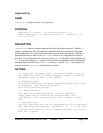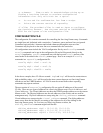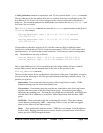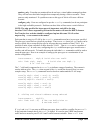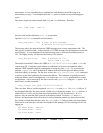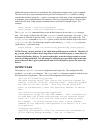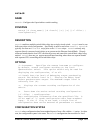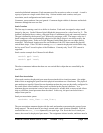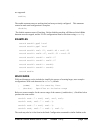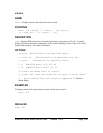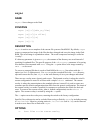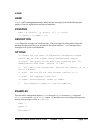
semicolon-delimited statements. Each statement specifies an action to take on a stack. A stack is
a group of ports on a single switch fabric chip. Actions include stack creation, stack port
association, stack configuration and stack control.
Comments, spaces and new lines are ignored. Comments begin with the # character and include
characters through the next new line.
Stack Creation
The first step in creating a stack is to define its location. Each stack is assigned a unique small
integer by the user. On the Ethernet Switch Blade this integer must be a value from 0 to 31. The
location is defined with two values; a Physical Point of Attachment (ppa) and a network location.
The ppa is defined by the keyword "ppa" followed by an integer value. The integer value is a 0
based contiguous value representing the physical switch fabric chip as it was discovered by the
Linux operating system. In the case of the Ethernet Switch Blade there are two chips directly
controlled. The network location specifies an IP address of the CPU that controls the physical
switch fabric chips. If the CPU that is running zstack controls the physical switch fabric chip,
the key word "local" is used in place of the IP address. Currently only "local" CPU control is
supported.
Stack creation example for a Ethernet Switch Blade:
stack0: ppa0 local;
stack1: ppa1 local;
The above statements indicate that there are two switch fabric chips that are controlled by the
local CPU.
Stack Port Association
After stack creation, the physical ports must be associated with a virtual port name. One might
think of this as mapping the ports from their physical association to a virtual name. The physical
port numbers are usually 0 based, but are dependent on how the ports are physically configured in
the switch fabric silicon and how those ports are labeled at the physical connector. At a
minimum the port association is used to move the ports of a second, third, or more switch silicon
chip to a different virtual port name then the others. In this way, the ports can be built into a
unique linear port list.
Stack port association syntax:
stack<N>: <zre_list> = <zre_list>;
The port association statement begins with the stack and number representing the group of ports
being mapped. The stack must be previously created with a stack creation command. After the
semicolon are two zre_lists separated by an equal sign. The first is the list of virtual port
names, the second is the physical port names. The assignment is done in order, and there must be
Ethernet Switch Blade User's Guide release 3.2.2j page 254



